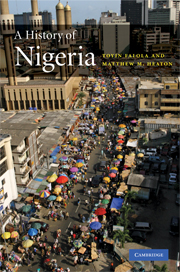Book contents
- Frontmatter
- Contents
- List of illustrations
- List of maps
- Acknowledgments
- Chronology
- Notable people in Nigerian history
- List of abbreviations
- Glossary
- Map 1 Major cities and ethnic groups in present-day Nigeria
- Introduction
- 1 Early states and societies, 9000 BCE – 1500 CE
- 2 Slavery, state, and society, c. 1500 – c. 1800
- 3 Political and economic transformations in the nineteenth century
- 4 Transition to British colonial rule, 1850 – 1903
- 5 Colonial society to 1929
- 6 Nationalist movements and independence, 1929 – 1960
- 7 Instability and civil war, 1960 – 1970
- 8 Oil, state, and society, 1970 – 1983
- 9 Civil society and democratic transition, 1984 – 2007
- 10 Nigeria and Nigerians in world history
- Concluding remarks: corruption, anti-corruption, and the 2007 elections
- Notes
- Selected bibliography
- Index
8 - Oil, state, and society, 1970 – 1983
Published online by Cambridge University Press: 05 June 2012
- Frontmatter
- Contents
- List of illustrations
- List of maps
- Acknowledgments
- Chronology
- Notable people in Nigerian history
- List of abbreviations
- Glossary
- Map 1 Major cities and ethnic groups in present-day Nigeria
- Introduction
- 1 Early states and societies, 9000 BCE – 1500 CE
- 2 Slavery, state, and society, c. 1500 – c. 1800
- 3 Political and economic transformations in the nineteenth century
- 4 Transition to British colonial rule, 1850 – 1903
- 5 Colonial society to 1929
- 6 Nationalist movements and independence, 1929 – 1960
- 7 Instability and civil war, 1960 – 1970
- 8 Oil, state, and society, 1970 – 1983
- 9 Civil society and democratic transition, 1984 – 2007
- 10 Nigeria and Nigerians in world history
- Concluding remarks: corruption, anti-corruption, and the 2007 elections
- Notes
- Selected bibliography
- Index
Summary
As Nigeria emerged from the civil war, it was clear that severe ethnic and regional fissures continued to exist, preventing the establishment of a strong national identity and therefore inhibiting the development of a stable, democratically elected federal government. These issues were temporarily marginalized, however, as the Nigerian economy grew drastically due to the rapid expansion of the petroleum sector in the early 1970s. Located mostly in the Niger delta region, petroleum became Nigeria's chief export and single-handedly made Nigeria the wealthiest country in Africa during the 1970s. Rather than contributing to the overall development of Nigeria and to improved living conditions for Nigerian citizens, however, this wealth was distributed unequally, benefiting primarily those people who had access to state power and, therefore, to the licenses, contracts, and revenues that accrued to the government from the petroleum sector. The result was a government apparatus that became increasingly divorced from its subjects, creating a stark disconnection between the will of the people and the actions of government officials – a disconnection that continues to afflict Nigeria. Three different regimes, two military and one civilian, oversaw the growth of the oil economy in the period between 1970 and 1983, but all three mismanaged government funds and contributed to the development of a kleptocracy that continues to plague Nigeria today. While a small class of politicians and entrepreneurs has become exceedingly wealthy via the oil economy, the majority of Nigerians remain mired in perpetual poverty.
- Type
- Chapter
- Information
- A History of Nigeria , pp. 181 - 208Publisher: Cambridge University PressPrint publication year: 2008



